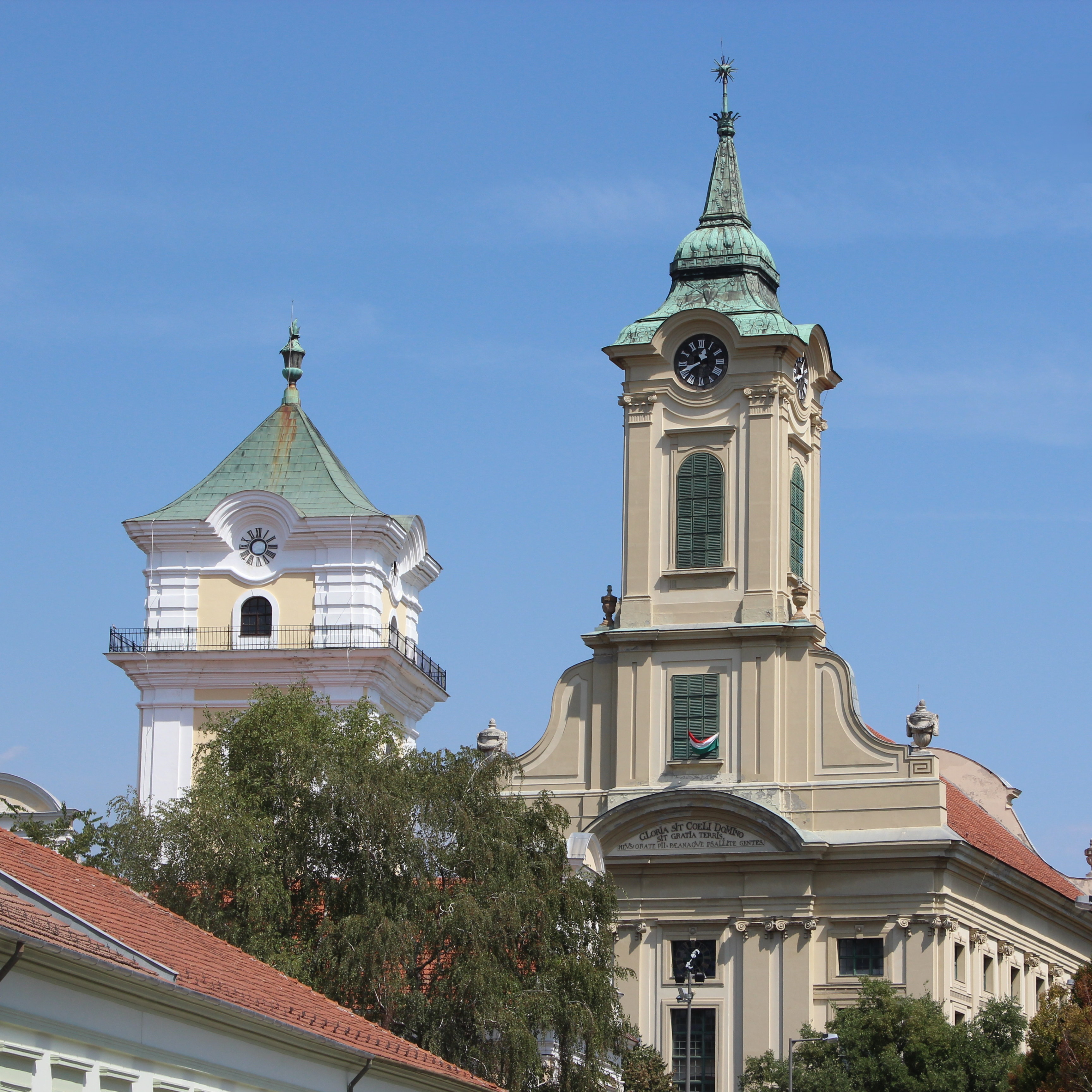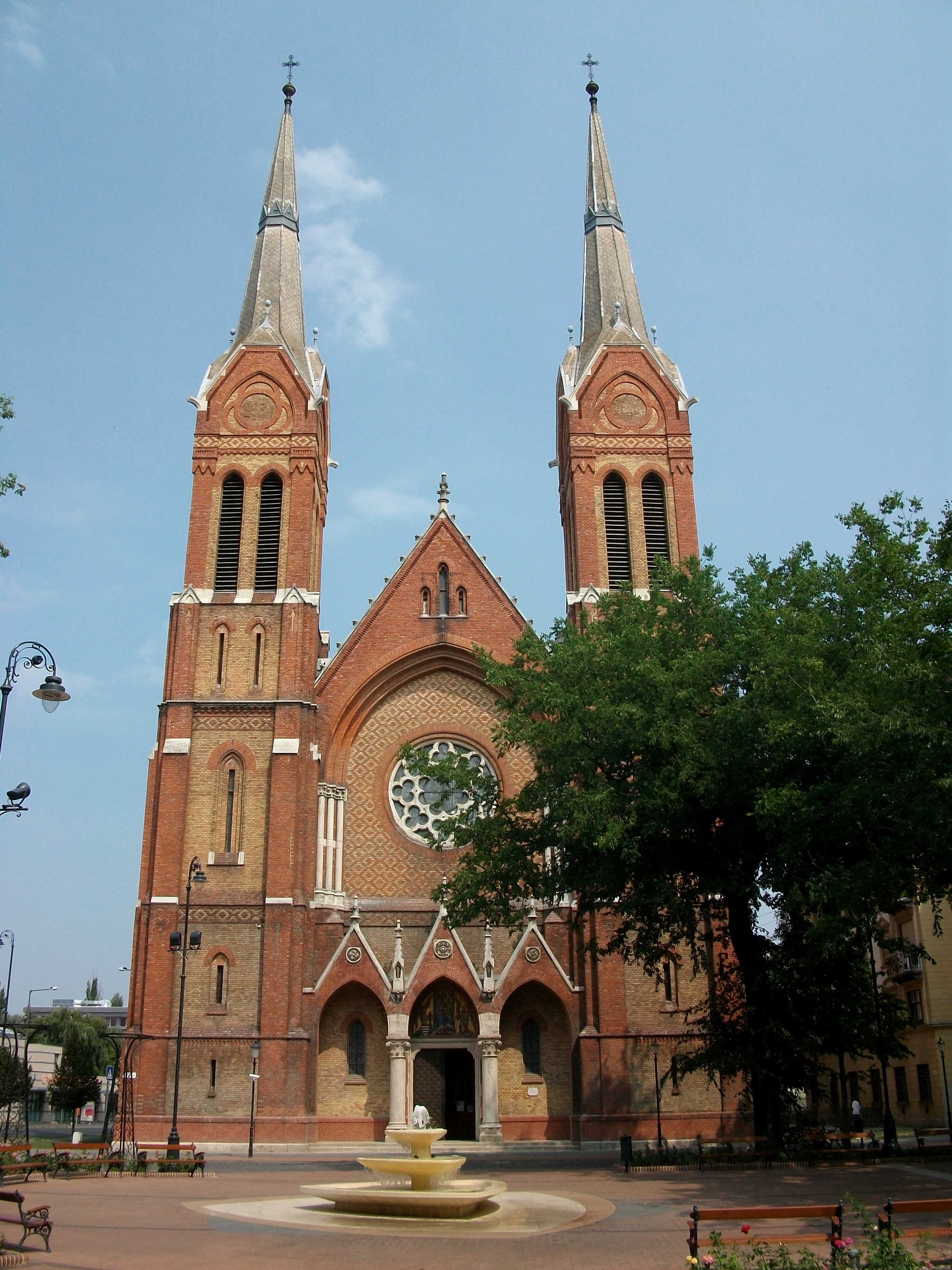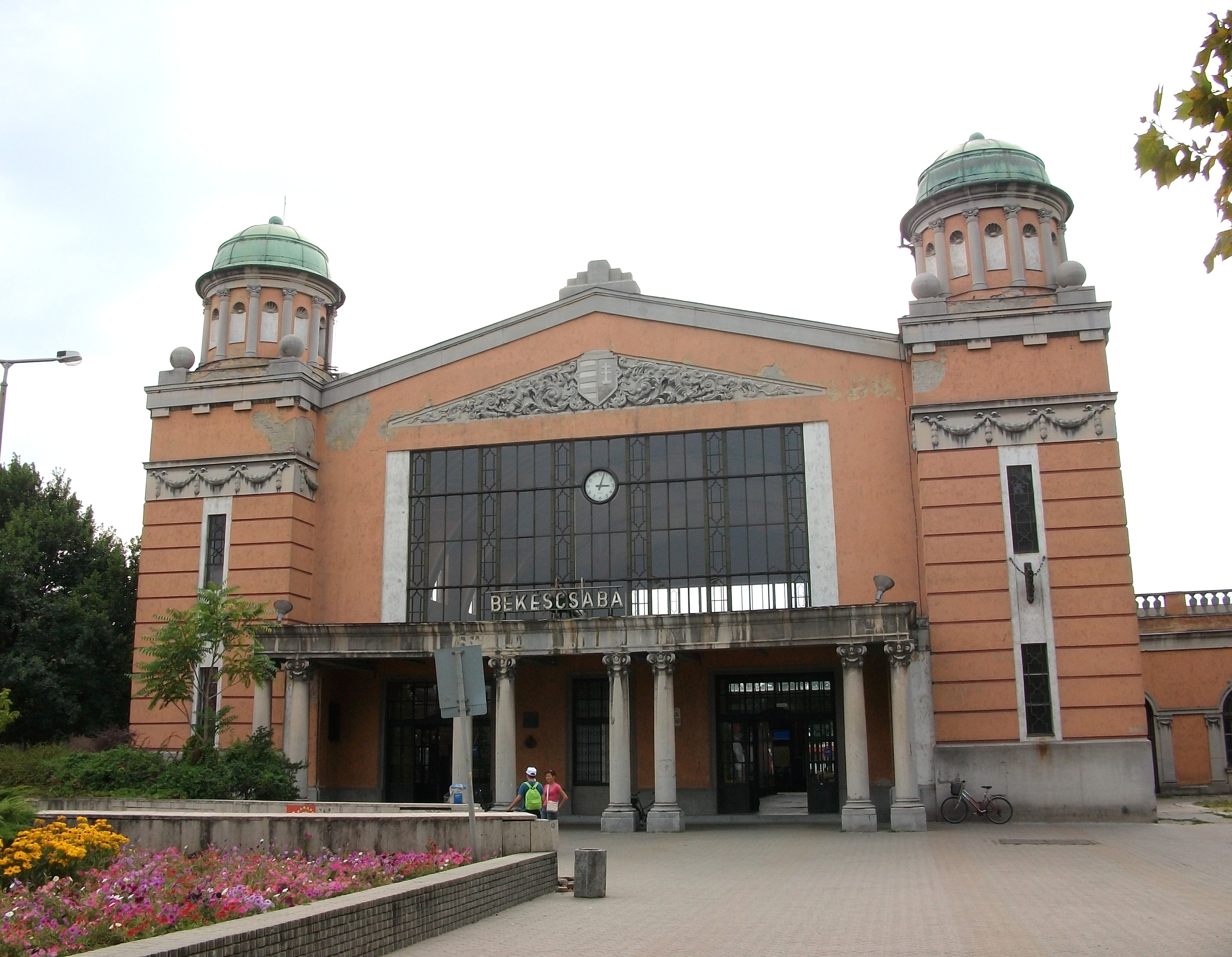Békéscsaba Airport on:
[Wikipedia]
[Google]
[Amazon]
Békéscsaba (; sk, Békešská Čaba; see also other alternative names) is a city with county rights in southeast Hungary, the capital of Békés County.

 The area has been inhabited since the ancient times. In the Iron Age the area had been conquered by the Scythians, by the Celts, then by the Huns. After the Hungarian Conquest, there were many small villages in the area.
The medieval Hungarian village of ''Csaba'' was established in the 13th century,Antal Papp: Magyarország (Hungary), Panoráma, Budapest, 1982, , p. 860, pp. 449-453 first mentioned in the 1330s. Besides Csaba, eight other villages stood where now the town stands. According to the Hungarian Royal Treasury, Békéscsaba was an ethnic Hungarian settlement in 1495.Károly Kocsis (DSc, University of Miskolc) – Zsolt Bottlik (PhD, Budapest University) – Patrik Tátrai: Etnikai térfolyamatok a Kárpát-medence határon túli régióiban, Magyar Tudományos Akadémia (Hungarian Academy of Sciences) – Földrajtudományi Kutatóintézet (Academy of Geographical Studies); Budapest; 2006.; , CD Atlas When the Turks conquered the southern and central parts of Hungary, and these territories became part of the Ottoman Empire, the town survived, but it became extinct during the fights against the Turks in the 17th century.
In 1715, Csaba is mentioned as a deserted place, but only one year later its name can be found in a document mentioning the tax-paying towns. It is likely that the new Csaba was founded by János György Harruckern, who earned distinction in the liberation fights against the Ottoman Empire and bought the area of Békés county. In 1718, Harruckern invited Slovak settlers from Upper Hungary to the deserted area. By 1847, the town was among the twenty largest towns of Hungary, with a population of 22,000. Nevertheless, Csaba was still like a large village, with muddy streets and crowded houses.
By 1858, the railway line reached the town. This brought development; new houses and factories were built, the town began to prosper. Still, by the end of the 19th century the unemployment caused great tension, and in 1891 a revolt was oppressed by the help of Romanian soldiers. One of the most important person in the politics of the town was
The area has been inhabited since the ancient times. In the Iron Age the area had been conquered by the Scythians, by the Celts, then by the Huns. After the Hungarian Conquest, there were many small villages in the area.
The medieval Hungarian village of ''Csaba'' was established in the 13th century,Antal Papp: Magyarország (Hungary), Panoráma, Budapest, 1982, , p. 860, pp. 449-453 first mentioned in the 1330s. Besides Csaba, eight other villages stood where now the town stands. According to the Hungarian Royal Treasury, Békéscsaba was an ethnic Hungarian settlement in 1495.Károly Kocsis (DSc, University of Miskolc) – Zsolt Bottlik (PhD, Budapest University) – Patrik Tátrai: Etnikai térfolyamatok a Kárpát-medence határon túli régióiban, Magyar Tudományos Akadémia (Hungarian Academy of Sciences) – Földrajtudományi Kutatóintézet (Academy of Geographical Studies); Budapest; 2006.; , CD Atlas When the Turks conquered the southern and central parts of Hungary, and these territories became part of the Ottoman Empire, the town survived, but it became extinct during the fights against the Turks in the 17th century.
In 1715, Csaba is mentioned as a deserted place, but only one year later its name can be found in a document mentioning the tax-paying towns. It is likely that the new Csaba was founded by János György Harruckern, who earned distinction in the liberation fights against the Ottoman Empire and bought the area of Békés county. In 1718, Harruckern invited Slovak settlers from Upper Hungary to the deserted area. By 1847, the town was among the twenty largest towns of Hungary, with a population of 22,000. Nevertheless, Csaba was still like a large village, with muddy streets and crowded houses.
By 1858, the railway line reached the town. This brought development; new houses and factories were built, the town began to prosper. Still, by the end of the 19th century the unemployment caused great tension, and in 1891 a revolt was oppressed by the help of Romanian soldiers. One of the most important person in the politics of the town was
/ref>
 * Great Lutheran Church (''Evangélikus Nagytemplom'')
* Small Lutheran Church (''Evangélikus Kistemplom'')
* Saint Anthony of Padua Cathedral (''Páduai Szent Antal székesegyház'')
* City hall (designed by Miklós Ybl, 1873) (''Városháza'')
* Mihály Munkácsy Museum (''Munkácsy Mihály Múzeum'')
* Mihály Munkácsy Memorial House (''Munkácsy Mihály Emlékház'')
* Mór Jókai Theatre (''Jókai Színház'')
* Slovak County House (''Szlovák Tájház'')
* Great Lutheran Church (''Evangélikus Nagytemplom'')
* Small Lutheran Church (''Evangélikus Kistemplom'')
* Saint Anthony of Padua Cathedral (''Páduai Szent Antal székesegyház'')
* City hall (designed by Miklós Ybl, 1873) (''Városháza'')
* Mihály Munkácsy Museum (''Munkácsy Mihály Múzeum'')
* Mihály Munkácsy Memorial House (''Munkácsy Mihály Emlékház'')
* Mór Jókai Theatre (''Jókai Színház'')
* Slovak County House (''Szlovák Tájház'')


Photos of the town
Aerial photography: Békéscsaba
{{DEFAULTSORT:Bekescsaba County seats in Hungary Cities with county rights of Hungary Populated places in Békés County
Geography
Békéscsaba is located in the Great Hungarian Plain, southeast from Budapest. Highway 44, 47, Békéscsaba beltway (around the city) and Budapest-Szolnok-Békéscsaba-Lökösháza high speed () railway line also cross the city. Highway 44 is a four-laneexpressway
Expressway may refer to:
* Controlled-access highway, the highest-grade type of highway with access ramps, lane markings, etc., for high-speed traffic.
* Limited-access road, a lower grade of highway or arterial road.
*Expressway, the fictional s ...
between Békéscsaba and Gyula. According to the 2011 census, the city has a total area of .
Name
'' Csaba'' is a popular Hungarian given name for boys of Turkic origin, while the prefix ''Békés
Békés (; ro, Bichiş; sk, Békéš) is a town in Békés County, Hungary. It lies about north of Békéscsaba and east of Budapest.
History
The area of the present town has been inhabited since ancient times, due to its good soil and pr ...
'' refers to the county named Békés, which means peaceful in Hungarian. Other names derived from the Hungarian one include german: Tschabe, ro, Bichișciaba, and sk, Békešská Čaba.
History

András L. Áchim
András () is a Hungarian masculine given name, the Hungarian form of ''Andrew''. Notable people with the name include:
* András Ádám-Stolpa (born 1921), Hungarian tennis player
* András Adorján (born 1950), Hungarian writer
* András Ágost ...
, who founded a peasants' party and succeeded in having Békéscsaba elevated to the rank of "city with council".
World War I brought suffering to the town. Between 1919 and 1920, Békéscsaba was under Romanian occupation. After the Treaty of Trianon, Hungary lost its most important Southern cities, Arad and Nagyvárad (Oradea
Oradea (, , ; german: Großwardein ; hu, Nagyvárad ) is a city in Romania, located in Crișana, a sub-region of Transylvania. The county seat, seat of Bihor County, Oradea is one of the most important economic, social and cultural centers in the ...
, both of them today in Romania), and Békéscsaba had to take over their roles, becoming the most important town of the area. Hungarians overtook Slovaks in the 1920s, become the majority according to the census was held in 1930.
Between the two world wars the recession caused poverty and unemployment, and a flood in 1925 did not help either.
Battles were not fought in the area during World War II. However, several events occurred in the town in 1944: between 24 and 26 June 1944, over 3,000 Jews were sent to Auschwitz
Auschwitz concentration camp ( (); also or ) was a complex of over 40 concentration and extermination camps operated by Nazi Germany in occupied Poland (in a portion annexed into Germany in 1939) during World War II and the Holocaust. It con ...
.
On 21 September 1944, the British and American Air Force bombed the railway station and its surroundings, killing more than 100 people. On 6 October 1944, the Soviet army occupied Békéscsaba.
During the Socialist times, Békéscsaba became the county seat of Békés (1950) and began to develop into one of the most important centres of food industry of Hungary. After the fall of the Communism in 1989, the industry nearly collapsed and many people lost their jobs. However, today the crisis seems to be over and Békéscsaba remained one of the most important centers of the Hungarian food industry.
Demographics
Languages
According to the 2011 census the total population of Békéscsaba were 62,050, of whom 61,912 people (99.8%) speak Hungarian, 10,140 (16.3%) English, 4,821 (7.8%)German
German(s) may refer to:
* Germany (of or related to)
**Germania (historical use)
* Germans, citizens of Germany, people of German ancestry, or native speakers of the German language
** For citizens of Germany, see also German nationality law
**Ger ...
and 3,399 (5.5%) speak Slovak.2011 Hungarian census, Békés county, tables 3.1.4.2, 3.1.6.1, 4.1.7.1/ref>
Ethnic groups
According to the 2011 census there were 51,842 (83.5%) Hungarians, 1,881 (3%)Slovaks
The Slovaks ( sk, Slováci, singular: ''Slovák'', feminine: ''Slovenka'', plural: ''Slovenky'') are a West Slavic ethnic group and nation native to Slovakia who share a common ancestry, culture, history and speak Slovak.
In Slovakia, 4.4 mi ...
, 402 (0.6%) Roma
Roma or ROMA may refer to:
Places Australia
* Roma, Queensland, a town
** Roma Airport
** Roma Courthouse
** Electoral district of Roma, defunct
** Town of Roma, defunct town, now part of the Maranoa Regional Council
*Roma Street, Brisbane, a ...
, 293 (0.5%) Romanians and 170 (0.3%) Germans in Békéscsaba. 9,666 people (15.6%) did not declare their ethnicity. In Hungary people can declare more than one ethnicity, so other people declared Hungarian and a minority one together.
Religion
According to the 1869 census (first modern census in Hungary) Békéscsaba had 30,022 inhabitants, of whom there were 21,988 (73.2%) Lutheran, 5,880 (19.6%) Roman Catholic, 1,043 (3.5%) Jewish, 520 (1.7%)Orthodox
Orthodox, Orthodoxy, or Orthodoxism may refer to:
Religion
* Orthodoxy, adherence to accepted norms, more specifically adherence to creeds, especially within Christianity and Judaism, but also less commonly in non-Abrahamic religions like Neo-pag ...
and 436 (1.4%) Hungarian Reformed
The Reformed Church in Hungary ( hu, Magyarországi Református Egyház, MRE) is the largest Protestant church in Hungary, with parishes among the Hungarian diaspora abroad. Today, it is made up of 1,249 congregations in 27 presbyteries and four ...
( Calvinist).
The 1949 census showed 45,892 people, 25,661 (56.2%) Lutheran, 14,216 (31.1%) Roman Catholic, 4,750 (10.4%) Hungarian Reformed and 498 (1.1%) Jewish.
In 2011 there were 10,694 (17.2%) Roman Catholic, 8,012 (12.9%) Lutheran and 4,408 (7.1%) Hungarian Reformed in Békéscsaba. 19,650 people (31.7%) were irreligious
Irreligion or nonreligion is the absence or rejection of religion, or indifference to it. Irreligion takes many forms, ranging from the casual and unaware to full-fledged philosophies such as atheism and agnosticism, secular humanism and ant ...
and 1,027 (1.7%) Atheist
Atheism, in the broadest sense, is an absence of belief in the existence of deities. Less broadly, atheism is a rejection of the belief that any deities exist. In an even narrower sense, atheism is specifically the position that there no ...
, while 16,883 people (27.2%) did not declare their religion.
Tourist sights
Politics
The current mayor of Békéscsaba is Péter Szarvas (Hajrá Békéscsaba). The local Municipal Assembly, elected at the 2019 local government elections, is made up of 18 members (1 Mayor, 12 Individual constituencies MEPs and 5 Compensation List MEPs) divided into this political parties and alliances:List of mayors
List of City Mayors from 1990:Climate
Békéscsaba has a humid continental climate ( Köppen ''Dfb'').Notable people
Born in Békéscsaba
*András L. Áchim
András () is a Hungarian masculine given name, the Hungarian form of ''Andrew''. Notable people with the name include:
* András Ádám-Stolpa (born 1921), Hungarian tennis player
* András Adorján (born 1950), Hungarian writer
* András Ágost ...
(1871-1911), Hungarian politician
* Gabriella Budai-Corfield (1974), International Sales Manager
* Ján Valašťan Dolinský
Ján Valašťan Dolinský (15 February 1892, Békéscsaba (Békéšská Čaba) – 2 March 1965, Nitra) was a Slovak composer, teacher, journalist, esperantist and collector of folk songs.
He graduated from a teacher's institute and then work ...
(1892–1965), Slovak composer
* Péter Gaszner (1939) Hungarian psychiatrist
* Dániel Gyollai
Dániel Gyollai (born 7 April 1997) is a Hungarian professional Association football, footballer, who plays as a Goalkeeper (association football), goalkeeper. He has represented Hungary at various youth levels.
Career
Gyollai was born in Bék ...
(1997), Footballer
* Gyula Hegyi
Gyula Hegyi (born 30 April 1951) is a Hungarian politician and a former Member of the European Parliament for the Hungarian Socialist Party, part of the Party of European Socialists.
Biography
Gyula Hegyi was born on 30 April 1951 in Békéscsab ...
(1951), politician
* Ágnes Késmárki
Agnes is a female given name derived from the Greek , meaning 'pure' or 'holy'. The name passed to Italian as Agnese, to French as Agnès, to Portuguese as Inês, and to Spanish as Inés. It is also written as Agness. The name is descended from ...
(1981), singer and songwriter
* Károly Klimó
Károly Klimó (; born 17 May 1936) is a Hungarian artist, one of the best known Hungarian artists of the present day. He is a non-figurative artist, member of the Széchenyi Academy of Literature and Arts.
Born in Békéscsaba, he studied ar ...
(1936), artist
* Gábor Laurenczy
Gábor Laurenczy (born 1954) is a Hungarian chemist and academic. He currently heads the Group of Catalysis for Energy and Environment of the École Polytechnique Fédérale de Lausanne.
Life
Laurenczy was born in 1954, in Békéscsaba, Hung ...
(1954), Hungarian chemist and academic
* András Mengyán
András () is a Hungarian masculine given name, the Hungarian form of ''Andrew''. Notable people with the name include:
* András Ádám-Stolpa (born 1921), Hungarian tennis player
* András Adorján (born 1950), Hungarian writer
* András Ágost ...
(1945), Fine artist, designer, professor
* Enikő Mihalik (1987), supermodel
* Henrietta Ónodi
Henrietta Ónodi (born May 22, 1974) is a Hungarian artistic gymnast. She competed at the 1992 and 1996 Olympics and won a gold and a silver medal in 1992. After retiring from gymnastics in 1997 she moved to the United States, married American O ...
(1974), gymnast
* Béla Szabados (1974), swimmer
* Ádám Szepesi
Ádám Szepesi (born 12 April 1945) is a retired Hungarian high jumper.
He was born in Békéscsaba. He finished fifth at the 1972 Summer Olympics with a jump of 2.18 metres. He became Hungarian high jump champion in 1972, rivalling with Endre ...
(1945), high jumper
* Margit Tevan (1901–1978), goldsmith
* László Vidovszky
''The native form of this personal name is'' Vidovszky László. ''This article uses the Western name order.''
László Vidovszky (born Békéscsaba, Hungary, 25 February 1944) is a Hungarian composer and pianist. During the 1970s he began com ...
(1944), composer and pianist
Lived in Békéscsaba
*Endre Bajcsy-Zsilinszky
Endre Kálmán Bajcsy-Zsilinszky (Szarvas, June 6, 1886 – Sopronkőhida, December 24, 1944), was an influential Hungarian national radical politician and an important voice in the struggle against German expansion and military policy. Execut ...
(1886-1944), Hungarian politician
* Mihály Munkácsy (1844-1900), Hungarian painter
*Péter Kelemen
Péter Kelemen (born 2 September 1946) is a retired Hungarian modern pentathlete.
Kelemen began his career in 1958 as a swimmer for Budapesti VSC. He switched to modern pentathlon in 1963, following the advice from his PE teacher, joining ...
World Champion Modern pentathlete
Died in Békéscsaba
* Sándor Erkel (1900), composer, son of Ferenc ErkelTwin towns – sister cities
Békéscsaba is twinned with: * Beiuș, Romania * Krompachy, Slovakia *Martin Martin may refer to:
Places
* Martin City (disambiguation)
* Martin County (disambiguation)
* Martin Township (disambiguation)
Antarctica
* Martin Peninsula, Marie Byrd Land
* Port Martin, Adelie Land
* Point Martin, South Orkney Islands
Austral ...
, Slovakia
* Mikkeli, Finland
* Odorheiu Secuiesc, Romania
* Tarnowskie Góry, Poland
* Trenčín, Slovakia
* Uzhhorod, Ukraine
* Wittenberg, Germany
* Zrenjanin, Serbia
References
External links
* in Hungarian, English and GermanPhotos of the town
Aerial photography: Békéscsaba
{{DEFAULTSORT:Bekescsaba County seats in Hungary Cities with county rights of Hungary Populated places in Békés County